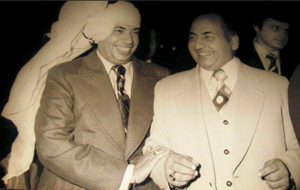Introduction: A Legend’s Enduring Mark
 The Hindi film industry has witnessed its share of ups and downs over the decades, with various artists navigating the ebb and flow of popularity. One such legendary figure, Mohammed Rafi, stood tall amid the changing tides, leaving an indelible mark on the world of music. His humility, divine smile, and benevolent nature left an everlasting impact on the songs he produced, earning him the admiration of both aficionados and laymen alike.
The Hindi film industry has witnessed its share of ups and downs over the decades, with various artists navigating the ebb and flow of popularity. One such legendary figure, Mohammed Rafi, stood tall amid the changing tides, leaving an indelible mark on the world of music. His humility, divine smile, and benevolent nature left an everlasting impact on the songs he produced, earning him the admiration of both aficionados and laymen alike.
The Rise of Kishore Kumar and Rafi’s Momentary Setback
In the late 1960s, the landscape of Hindi cinema witnessed a seismic shift when Kishore Kumar, an exceptional singer, surged ahead of Mohammed Rafi in the popularity charts. While both were contemporaries, Rafi was known for his dynamic and diverse singing style. However, the release of “Aradhana” marked a turning point, catapulting Kishore Kumar to the coveted No. 1 spot, overshadowing Rafi’s supremacy. This period presented a unique challenge to Rafi’s established reign.
R.D. Burman’s Influence and Media Rivalry
R.D. Burman’s innovative compositions in “Aradhana” set new trends, contributing to the ascent of Kishore Kumar and marking what some perceived as the decline of Mohammed Rafi. Media fueled the fire, comparing the two maestros and igniting a contentious debate over who was the superior singer. This period of rivalry and intense media scrutiny took a toll on both legends, who, despite the external pressures, harbored immense respect for each other.
Kishore Kumar’s Stand Against Unnecessary Comparison
As the media frenzy reached its zenith, Kishore Kumar, recognizing the undue comparison and irrelevant hype, took a definitive stand. He expressed deep pain over the unnecessary rivalry and publicly urged the media to cease the comparisons, emphasizing his profound respect for Mohammed Rafi. It was a poignant moment that clearly reflected the genuine camaraderie shared by these musical titans, highlighting their artistic integrity above fleeting popularity contests.
The Unseen Impact and Mahendra Kapoor’s Consolation
Decades later, Rohan Kapoor, son of the renowned singer Mahendra Kapoor, shed light on the aftermath of this rivalry. During the peak of Kishore Kumar’s popularity, Mohammed Rafi, feeling the weight of the changing tide, sought solace in a private meeting with Mahendra Kapoor. Rafi expressed shock at being ignored by producers who once revered him, questioning whether he had become a lesser singer. Mahendra Kapoor, a true friend and fellow artist, reassured Rafi, attributing the change to the fickle nature of the industry rather than any fault of Rafi’s. He comforted Rafi by reminding him that the same producers who treated him poorly would eventually do so to others as well, urging him to let it go and rise above the transient whims of fame.
Rising Above Adversity with “Tum Jo Mil Gaye Ho”
In a truly poignant moment, Mohammed Rafi, despite the significant challenges he faced, showcased his unwavering resilience and artistic brilliance. He sang a few lines from his recent song, “Tum Jo Mil Gaye Ho …”, which he had recorded for the 1973 film Hanste Zakhm by the great composer Madan Mohan Kohli. The song went on to become a massive hit, resonating deeply with audiences and powerfully reaffirming Rafi’s position as a singer par excellence, proving his timeless talent transcended temporary shifts in industry dynamics.
Conclusion: A Timeless Maestro’s Enduring Legacy
Mohammed Rafi’s journey, marked by challenges and momentary setbacks, stands as a testament to his enduring legacy. His ability to rise above the transient nature of fame, coupled with his unmatched talent, solidifies his status as a timeless maestro in the annals of Hindi music history. His story continues to inspire, reminding us that true artistry and humility prevail over passing trends.
Our next article will explore Rafi Sahab’s iconic evolution from inception to the finale.
+~ Balwant S. Wadhwani
Balwant S. Wadhwani is the founder of RafiFanClub.com. A lifelong devotee and archivist at heart, he has dedicated his life to sheltering the echoes of the Golden Era. His singular mission is to ensure Mohammad Rafi’s divine voice transcends every earthly boundary—traveling to the most humble, distant hearts to unite all souls, regardless of language, caste, or creed, in a shared moment of celestial grace.
